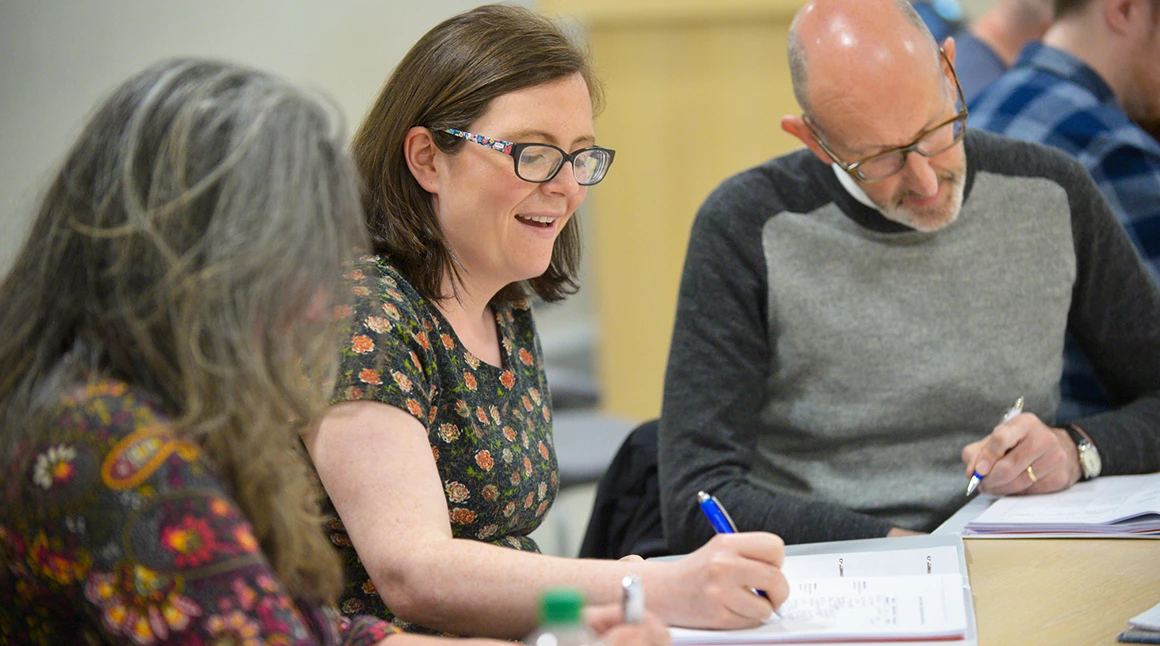
Train your delegates as mediators with the five-day Interpersonal Mediation Practitioner’s Certificate (IMPC), the market-leading 40-hour professional mediator qualification.
One reason for the popularity of the course is that all of our trainers are themselves practising mediators, who pass on their mediation skills through a number of exercises, lectures, group discussions, lively dispute simulations, and real case studies. We emphasise learning-by-doing in order to build up your delegates’ competence and confidence as mediators.
Our qualification sits at Level 4 on Ofqual’s ‘Register of Regulated Qualifications’, alongside A Levels and Degrees, and is the highest level of mediator training currently available. The course is also formally recognised as a ‘Certified Mediator Training Program’ by the International Mediation Institute (IMI), meaning that your qualification is recognised worldwide and not just in the UK.
This course is delivered in-house for groups of 6 to 12 delegates within an organisation. If you are an individual looking for similar training, we would recommend the open-access version of our mediator qualification course.
Leads to 'Accredited Mediator' status
The UK’s only Level 4 mediation course
Learn to resolve all types of interpersonal disputes
Recognised by the International Mediation Institute

Our training course sits on Ofqual’s 'Register of Regulated Qualifications', the official regulator of examinations. It is recognised at Level 4 - the highest level of mediator qualification available.
The qualification is formally recognised as a Certified Mediator Training Program by the International Mediation Institute (IMI). Successful delegates can apply for 'IMI Qualified Mediator' status.
ISO-9001 is the internationally-recognised standard for quality management. You can be sure that all of our training will be carried out in an efficient and quality-focused manner.
All of our trainers are practising mediators with many years of experience. They are also certified adult educators, meaning you’re in capable hands during your training!
We come and deliver the course face-to-face at your location, at a time and place to suit you. We aim to be as flexible as possible to meet your requirements.
All successful delegates will receive exclusive access to our online Learner Zone, a hub of useful information, tools, and resources for qualified mediators.
The aim of this course is to get you to the point of being confident and competent to practise all types of interpersonal mediation (for neighbourhood, tenancy, intra-family, medical, and complaint disputes), and to get you to the point of Accredited Mediator status.
At the conclusion of the course, you will be able to:
Understand the underpinning principles of interpersonal mediation
How mediation compares with other forms of dispute resolution. Why and how mediation works: putting people and their needs at the heart of the process.
Understand how people's behaviours can impact upon conflict
What makes people behave the way they do when they are in conflict and how this will influence what we do as mediators. Getting people’s buy-in.
Understand the structure of the mediation process
The steps and stages of our structured mediation model, and the purpose and structure of each stage. What can go wrong and dealing with the unexpected.
Understand the particular role of the mediator
The mediator’s role, how this differs from other roles, and the importance of impartiality and confidentiality. Where mediation fits in with other processes.
Understand the skills required for effective mediation
You will mediate simulated cases alongside fellow learners and receive detailed feedback. Having a go at one of our specially-chosen case examples.
Reflect upon your practice and consider your own development
Your strengths and areas for improvement as mediators, and how you will specifically apply your new skills and knowledge in the future.
The Interpersonal Mediation Practitioner's Certificate covers everything you need to know to become a professional mediator for neighbourhood, tenancy, intra-family, medical, and complaint disputes.
This includes:
The psychology of conflict
What makes people behave the way they do when in conflict and how this will influence what we do as mediators.
The principles of mediation
How mediation compares with other ways of resolving disputes and how to choose what sorts of situations should be mediated. How and why mediation works.
Managing the mediation process
The steps and stages of our structured seven-stage mediation model and the purpose of each stage. Dealing with resistance, disruption, and unexpected obstacles during the mediation sessions.
Key mediation skills
Practising on simulated cases and receiving live feedback from your tutor. Learning key skills such as reframing, reflection, and active listening.
Diversity competence
Acknowledging that diversity of some sort exists among all participants and that only through acknowledgement can we achieve the best kind of resolution
Taking your practice forward
Your strengths and areas for improvement, and factoring these into a personal development plan. Conforming to best practice and adhering to UK Mediation’s Code of Conduct.
Our trainers have a wealth of practical mediation experience and are able to adapt the course content to the make-up of the particular group.
Our courses are live interactive events run by a practising mediator who is an expert in the field.
We use a range of methods to deliver the course, including:
Custom-made video
We use our own professionally produced, broadcast quality video of the development of an interpersonal dispute and the step-by-step mediation process being demonstrated by a real mediator.
Lecture and live discussion
Our course is very practical and centres on learning-by-doing. The mediator-trainers who lead the course are experts in passing on their expertise to you, including by relating their own mediation ‘war stories’.
Group exercises
We have trained over 6,000 mediators in the last 26 years and have learnt much from many, many conflict stories. We’d love to hear about your own experiences as well, and for you to work in groups with fellow learners as they too become professional mediators.
Practice sessions with simulated case material
Along with the dispute scenario in our brilliant video, we have a whole library of examples of disputes that we have encountered and resolved. We’d like you to try your hand at resolving them as well!
You are assessed through a combination of a practical on-course skills assessment, and a written assessment following the training. You are given four weeks post-course to complete the written assessment, which people tell us takes them around 8-12 hours of private study time.
Ever since we began back in 1999, a range of bodies and organisations have stepped up to accredit, register, validate, and in various ways rubber-stamp the activities of mediators. We can understand if you would find it a bit confusing!
However, we can explain it as such:
The Interpersonal Mediation Practitioner’s Certificate is the only qualification you need. It is a proper qualification on Ofqual’s 'Register of Regulated Qualifications', alongside GCSEs, A-Levels, and Diplomas. This makes it one of the very few officially-recognised and regulated mediator qualifications in the UK, and the only qualification at Ofqual’s Level Four.
The course is also a 'Certified Mediator Training Programme' (CMTP) with the International Mediation Institute (IMI). When you have achieved on the course, you can apply to be listed as an ‘IMI Qualified Mediator’ and be recognised as having completed a high-quality mediation course that meets international standards.

Want to find out more or get a quote from us?
We're a friendly bunch at UK Mediation and we're always happy to talk about our training courses.
Whether you're interested in a specific course of ours, or if you would just like some friendly advice, just fill out the form and we'll get straight back to you.
Please get in touch!
We understand that you may have some queries about the course’s content, the resulting qualification, or about how the training is delivered. We’ve gathered together some of the most Frequently Asked Questions and have answered them below.
Please get in touch if you have any questions we might have missed and one of our experts will be more than happy to help. You can contact our team here.